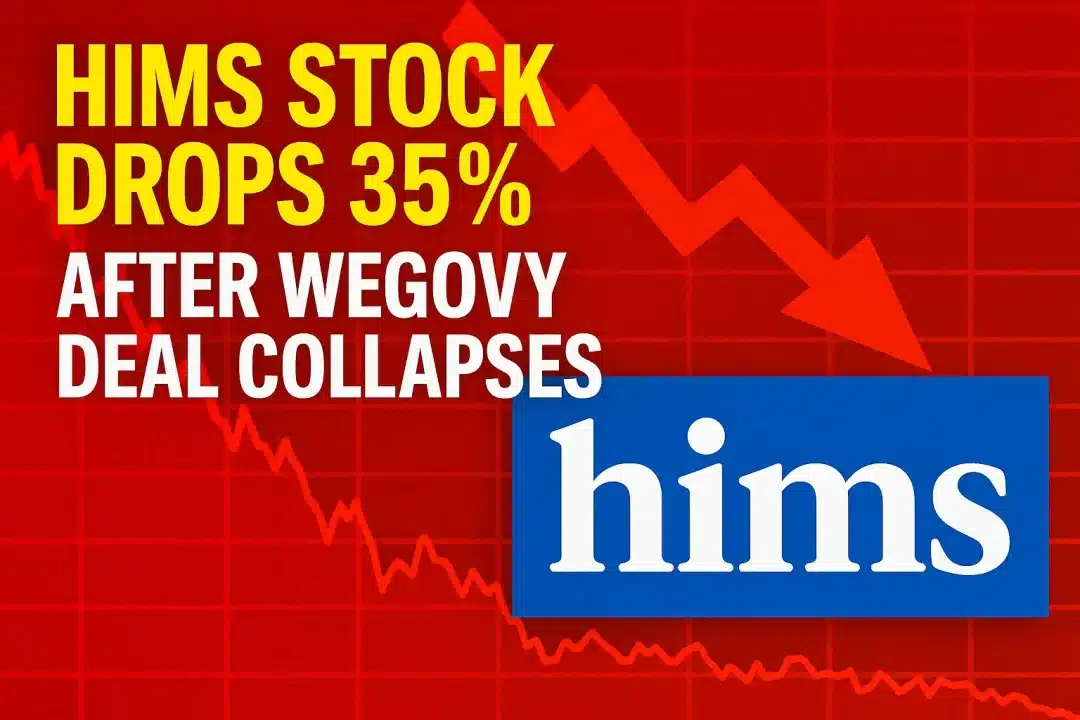
Hims & Hers Health Inc. (NYSE: HIMS) saw its stock plummet 34.63% on Monday closing at $41.98. Now, the world watches as it attempts to rebound Tuesday. This sharp decline followed Novo Nordisk’s abrupt decision to terminate a high-profile partnership involving its weight-loss drug, Wegovy. The fallout stems from legal concerns surrounding Hims’ sale of compounded versions of semaglutide, the active ingredient in Wegovy.
What happened between Hims & Hers and Novo Nordisk?
Back in April, Hims & Hers entered an agreement to distribute Wegovy through its telehealth platform. The goal was to meet the rising demand for GLP-1 weight-loss treatments. However, Novo Nordisk now alleges the telehealth provider violated U.S. laws by continuing to sell compounded semaglutide under the pretense of personalized care. Since the FDA declared an end to the Wegovy shortage in May, those products should have been pulled from broad distribution.
In a public statement, Novo Nordisk criticized Hims & Hers for engaging in deceptive marketing practices. “Hims & Hers has failed to adhere to the law which prohibits mass sales of compounded drugs,” the pharmaceutical company declared.
Hims CEO pushes back
In response, CEO Andrew Dudum took to X to dispute Novo Nordisk’s claims. He accused the company of pressuring Hims to exclusively promote branded Wegovy, a demand he described as anticompetitive. “We refuse to be strong-armed by any pharmaceutical company’s anticompetitive demands,” Dudum stated. He reaffirmed Hims’ dedication to clinical independence and its commitment to personalized treatment options.
Why it matters for the telehealth industry
This controversy highlights rising legal and regulatory scrutiny for the digital health sector. According to Citi analyst Daniel Grosslight, the incident sends a “clear warning shot” to telehealth companies that rely on compounded medications. It raises significant compliance risks for platforms offering alternatives to GLP-1s.
Pharma giants like Novo Nordisk and Eli Lilly are fiercely defending market share in the booming weight-loss drug sector. Novo has now vowed to collaborate only with platforms that prioritize safe, FDA-approved treatments. The company also announced plans to escalate its legal actions against mass compounding.
Financial impact on Hims
The terminated partnership delivers a serious setback to Hims’ financial momentum. In 2024, the company generated over $200 million from its GLP-1 weight-loss business—accounting for a significant portion of its $1.48 billion in total revenue. Losing access to Wegovy sales jeopardizes one of its fastest-growing revenue streams.
As a result, the nearly 35% decline in stock value erased hundreds of millions in market capitalization. Furthermore, analysts have pointed to slowing subscription growth across Hims’ broader range of services, including offerings for mental health, hair loss, and sexual wellness.
The bigger battle: Compounded vs. branded drugs
At the core of this dispute lies the contentious issue of compounded drugs. These medications are custom-made by pharmacists, typically during shortages or when patients require alternatives to standard formulations. But with the Wegovy shortage officially resolved, continued mass distribution is now viewed by Novo as both unlawful and unsafe.
Novo Nordisk also cited troubling findings from its investigation into compounded semaglutide. Some ingredients were sourced from unregulated foreign suppliers in China, many of which had never been inspected by the FDA or had failed past inspections. This discovery has reignited debate over the safety and oversight of compounded medications.
Outlook: What investors should watch
Hims must now navigate a difficult road ahead. Key concerns include whether regulators will intensify crackdowns on compounded GLP-1s and whether Hims can pivot its business model to sustain growth without Wegovy. Additionally, the risk of further legal actions and scrutiny could extend to other telehealth firms.
Investors should closely monitor Hims’ communications, regulatory developments, and the company’s upcoming earnings reports. For now, volatility remains high, and confidence in Hims’ long-term prospects may take time to rebuild.
